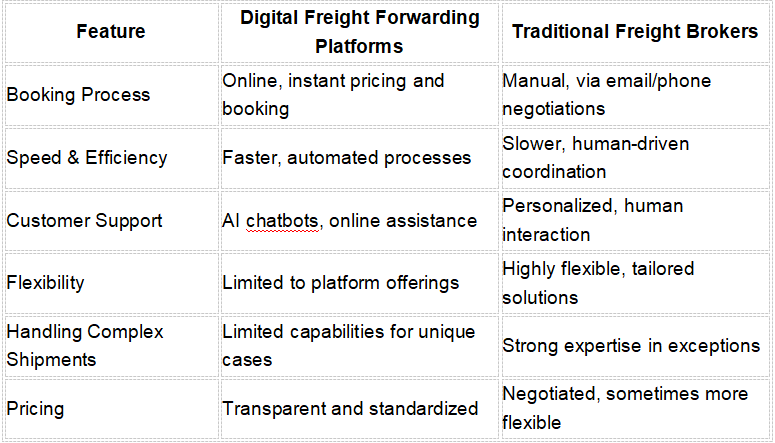The logistics industry is evolving rapidly, and one of the biggest disruptions in recent years is the rise of digital freight forwarding platforms. These technology-driven platforms promise to make global shipping more transparent, efficient, and cost-effective. But does this mean that traditional freight forwarders and brokers will become obsolete?
This article explores the differences between digital platforms and traditional brokers, their respective advantages, and whether digital freight forwarding is truly replacing conventional logistics intermediaries.
What Are Digital Freight Forwarding Platforms?
Digital freight forwarding platforms leverage automation, AI, and big data to streamline the logistics process. Instead of relying on manual paperwork, phone calls, and emails, these platforms provide an online interface where shippers can:
✅ Get instant freight quotes
✅ Book shipments directly with carriers
✅ Track cargo in real time
✅ Manage documents digitally
✅ Optimize routes based on data-driven insights
By integrating with various logistics stakeholders, such as ocean carriers, airlines, trucking companies, and customs authorities, digital freight platforms enable a seamless shipping experience without the traditional back-and-forth communication.
Examples of Digital Freight Forwarding Capabilities:
· Automated Pricing: Real-time rate comparison across multiple carriers
· AI-Powered Route Optimization: Intelligent route planning based on demand and capacity
· End-to-End Visibility: Live shipment tracking and predictive analytics
· Paperless Documentation: Electronic Bills of Lading (eB/L) and customs clearance integration
These innovations drastically reduce delays and human errors, making digital platforms a game-changer in logistics.
How Do Traditional Freight Brokers Operate?
Traditional freight brokers act as intermediaries between shippers and carriers, negotiating rates, handling documentation, and ensuring cargo moves smoothly. Their services typically include:
✅ Customized shipping solutions based on client needs
✅ Dedicated customer service and personalized problem-solving
✅ Expertise in handling complex or specialized shipments
✅ Strong relationships with carriers, leading to flexible pricing and space allocation
While traditional brokers may not offer the same level of automation as digital platforms, they add value through human expertise, particularly in managing exceptions, handling regulatory compliance, and offering tailored logistics strategies.
Digital Freight Forwarders vs. Traditional Brokers: Key Differences

Both models have their advantages, depending on the needs of the shipper.
Are Digital Freight Forwarders Replacing Traditional Brokers?
Not entirely. While digital platforms provide efficiency and cost savings, traditional brokers still hold a significant edge in areas where human expertise is irreplaceable.
Where Digital Freight Forwarders Excel:
✅ High-volume, standardized shipments that require speed and automation
✅ Small and mid-sized businesses looking for a self-service logistics solution
✅ Shippers prioritizing cost transparency over personalized service
Where Traditional Brokers Still Win:
✅ Complex cargo shipments requiring custom handling
✅ Industries with strict regulations, such as pharmaceuticals or hazardous goods
✅ Businesses that need a trusted partner to navigate global logistics challenges
In reality, the future of freight forwarding will likely blend both models. Many traditional freight forwarders are integrating digital solutions into their services, offering the best of both worlds—automation with a human touch.
Digital freight forwarding platforms are transforming global logistics, making shipping faster and more accessible. However, traditional brokers are not disappearing—they are evolving alongside technology. The most successful freight forwarders of the future will be those who embrace digital tools while maintaining strong industry expertise and customer relationships.
For businesses, the choice depends on their logistics needs. If you require speed and automation, digital platforms may be the answer. If you need customized solutions and expert problem-solving, traditional brokers still offer immense value.
At JCtrans, we help businesses navigate these options, connecting them with the right logistics partners to optimize global trade. Whether you choose a digital freight forwarder or a traditional broker, making an informed decision is key to shipping success.






